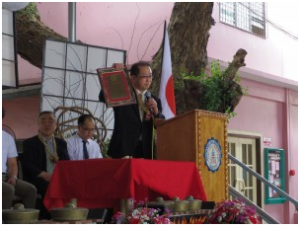“Expectation from Nikkei Jin Kai”
Expectation from Nikkei Jin Kai
by: Masataka Ajiro
President, Japan-Philippines Volunteer Association
This time I would like to talk about my expectations from Nikkei Jin Kai.
First, I would like to tell you a little bit about the JPVA (Japan Philippine Volunteers Association)The Japan-Philippine Volunteers Association aims to look for problems/issues about both countries; Philippines and Japan and to look for ideas on how to reduce those issues/problems.I met the Japanese descendants (Nikkei Jin) way back in 1984, then created a school, from there, it continue to improve from elementary to High School until college.
In 1991, I created the Japan Philippine Volunteers Association together with the Japanese Descendants (Nikkei Jin), mainly for the education of poor children, problems about caregivers and to have tree planting activities on the mountains, collect Recorders in Japan, established recorder ensemble group and organized activities in schools in the mountains, to create a
Historical museum where the documents about the Davao history are accumulated and it’s a retained culture are preserved.
Our activities aim to make our partners (people) be independent, to give chance/opportunity to people. A nice isn’t it? That’s why, in order to pursue an activity to become independent, we have to let go of our hands from them (Nikkei Jin Kai). So, the Japanese School, Elementary School, Philippine-Japanese Historical Museum, Recorder Group and others are not by the Japan Philippine Volunteer Association, it is now handled by the Nikkei Jin Kai.
Recent Tendencies
The activities from Japan to Philippines were done in the 20th century. In the 21st century, the issues about Japan stand out than the issues in the Philippines. In Japan right now, ¼ of its population is composed of people aged 65 and above. There are many old people but the numbers of young people who will support them are few. There are insufficient shelters for old people who need care. This is the big problem of Japan.
In our office in Japan, we are receiving a lot of calls from elderly, asking if they can hire caregivers from the Philippines or if it is ok to live in the Philippines.
20 years ago, the problem was about the children in the Philippines, but now, the problem about the elderly is increasing.
From there, there are things I want to propose to the Nikkei Jin Kai, I hope that Nikkei Jin Kai will help the old people in Japan. I wish that helping them will be the first in line of their activities.
- The idea is there but, we hope to have a Japanese language specialization at MKD or to have any kind of specialization to rear more skilled young people who could go to Japan. If it is possible, they will not go to Japan to get hired and work but they will go there to help Japan. We, together with the Nikkei Jin Kai want to create a (group of Young People from Overseas) and then, we want to inform the government of Japan about it for public information.
- I want to create a group of skilled people to come to Japan among MKD graduates. The MKD will be the bridge towards strong ties between Japan and Philippines. I want MKD to be that kind of institution.
- You also need to start a campaign for building Japanese nursing home for Japanese elderly. In cooperation with municipal government in Japan, you start the campaign for building a resort for Japanese elderly. Mayor of Davao City, Rodrigo R. Duterte likes the idea of this campaign very much and he told that he would lend land as much as possible. People who are interested in this idea will visit Japan soon. I am scheduled to engage shortly in building a small nursing home in dormitory of Japan Philippines Volunteer Association.
- Another thing which I suggest is to ask all parties concerned to have direct flights from Japan to Davao in cooperation with Hello World. I have already discussed about this matter with person concerned.
There are many other things which Philippine Nikkei Jin Kai, Inc., MKD and we can do for the Philippines and Japan.Let us all work together and make Davao City famous for its safety and easy access from Japan, “The City of Healing Power”.
Davao and Japan will start making a new history. The monument in Mintal was built to commemorate this. Mayor of Davao City, Hon. Rodrigo R. Duterte built this monument for the new relationship for the Philippines and Japan. Unveiling ceremony is scheduled on October 7, 2013 from two o’clock in the afternoon. I hope you all could come to witness it.
I have a message for Japanese Descendants. Let’s start new activities together with us. You, members of Philippine Nikkei Jin Kai, Inc. in Davao are the bridge of Philippines and Japan.
I hope that next year we will have a direct flight from Narita to Davao and lots of Visitors from Japan will join Philippine Japan Festival. I don’t have much time left, however I will continue to support Davao and Japan to be able to have a good relationship in many ways as long as I live.
Thank you for listening.


